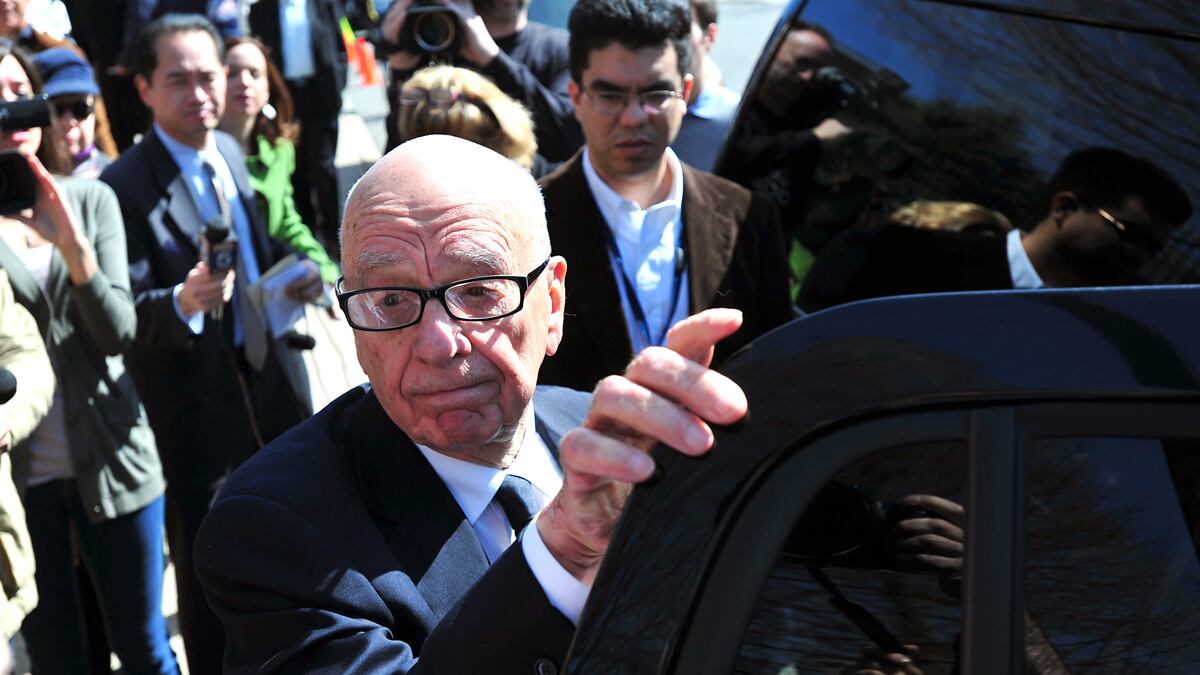Rupert Murdoch's decision to step down from several boards that nominally control his U.K. newspaper interests prompted excited minds on both sides of the Atlantic this weekend to speculate it was a precursor to the 81-year-old media magnate getting out of newspapers altogether. The speculators are wrong.

For a start, the boards he's resigning from have no power and very rarely meet. They're boilerplate corporate structures masking the fact Murdoch is in complete control of his U.K. papers.
The Times Newspaper board, for example, is supposed to oversee the London Times and The Sunday Times. I doubt it’s ever taken on an important decision in its life, unless prompted to by Murdoch. Ditto the News Group board, which oversees his London tabloids (make that tabloid, since News of the World was closed at the height of the hacking scandal, leaving only The Sun).
Now Murdoch is gone from both. But he will still hold sway over the newspapers under their toothless grip. He is also walking away from the News International board, the London corporate brolly for all his U.K. newspapers. That might seem more significant. But, again, it’s pretty much a corporate shell, and the CEO will still report directly to Murdoch in New York.
Murdoch spin doctors in the U.S. described the move as a “corporate house-cleaning exercise” prior to News Corp. being split into an entertainment company (including all the Fox brands) and a publishing company (which will encompass his U.S., U.K., and Australian newspapers). I’m inclined to believe them. After all, they even admitted the boards were of minor importance.
The entertainment and publishing divisions will become publicly quoted companies, and Murdoch will chair both. He will be CEO of the entertainment company only, but he hasn’t been CEO of his U.K. newspapers for two decades—and that hasn’t made his grip on them any less vicelike.
The fact is Murdoch will still be chairman of the largest newspaper group in the world after the split. His interest in Britain might be waning—especially now that he’s largely persona non grata among the London political elite after the hacking scandal—but the publishing company will include The Wall Street Journal, which he acquired only a few years ago and which is now the main reason he gets out of bed very early every morning. He’s not about to sell that any time soon.
So the idea that Murdoch is getting out of newspapers is fanciful, spread by those who wish it were so. British Labour M.P. Tom Watson is accusing Murdoch of “deserting his loyal [newspaper] staff” in the U.K. and claims they will “smell betrayal.” But Watson wants to run Murdoch out of London town and, like so many frantic British commentators, is just stirring things up. He is likely to be disappointed.
Murdoch has kept his British options open. On the one hand he knows he’s not welcome in Britain anymore, and in his darker moments he ponders whether he should just throw it all in and take his billions elsewhere.
But that would spell victory for the British establishment, to which he has accorded the hated and largely mythical status all his life. That makes him inclined to use his U.K. papers to go to war with it, specifically to make life difficult for the Cameron government, which he blames for the wide-ranging judicial inquiry into newspapers currently underway in the U.K. and even encouraging the breakup of Britain by supporting Scottish separatism via his Glasgow-based Sun. That would be sweet revenge indeed!
The rest of the Murdoch family does not share his enthusiasm for newspapers. Nor do his News Corp. executives in New York. Spinning off the papers, many of them loss-making, into a new public company will undoubtedly made life tougher for them, since cross-subsidy from the profitable entertainment divisions will no longer be possible. But I suspect any major Murdoch retreat from newspapers will have to await the old man’s departure to the great newsroom in the sky.






